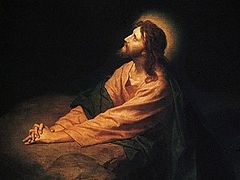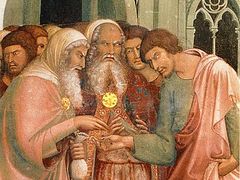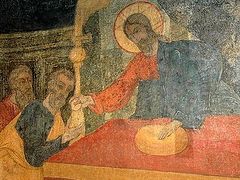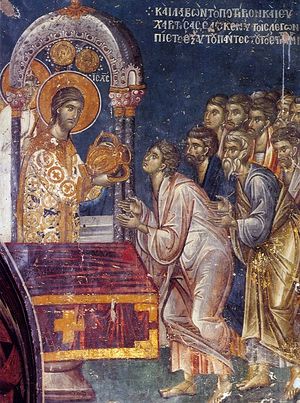 The question of whether or not Judas received communion at the Last Supper may seem unimportant in comparison with other questions which are essential and/or directly related to our salvation. Nevertheless, it can have moral significance for our life, since it concerns the topic of worthy (or unworthy) communing of the Holy Mysteries of Christ.
The question of whether or not Judas received communion at the Last Supper may seem unimportant in comparison with other questions which are essential and/or directly related to our salvation. Nevertheless, it can have moral significance for our life, since it concerns the topic of worthy (or unworthy) communing of the Holy Mysteries of Christ.
When did Judas leave?
In the interpretations and textbooks on the Holy Scriptures, we will not find a definitive answer. However, most interpreters of the Holy Scriptures, and compilers of the chronological presentation of gospel events, are of the opinion that Judas left the Last Supper immediately before the establishment of the Sacrament of Holy Communion, and therefore, did not receive Communion.
This point of view is set forth in the “Commentary on the Holy Scriptures of the New Testament” by Archbishop Averky (Taushev) of Syracuse (ROCOR), which coincides with the main consensus of the textbooks of Russian seminaries: “However, it is imperative to assume that with Judas’s exit, the Lord first established the mystery of Eucharist, which is narrated upon by the first three Evangelists, while John is silent.”1
The departure of Judas from the Last Supper precedes the Sacrament of the Eucharist, performed by the Lord, in the gospel textbook “The Gospel Synopsis”, published by Saint Tikhon’s Orthodox Theological University.2 We find the same sequence in the presentation of gospel events according to pre-revolutionary textbooks on the New Testament.3
Positions in which Judas was recognized as a partaker of the Body and Blood of Christ, along with the other apostles, are also found, but appear to be more like an exception to the general rule.4 And this is not surprising. Almost all Gospel interpreters of the nineteenth to early twentieth centuries deny the participation of Judas in the first Christian Eucharist. We will find this position from the Rector of Moscow Theological Academy, a friend and supporter of Saint Philaret (Drozdov), Archpriest Alexander Gorsky5, in the interpretation of the Gospel of John by Bishop Michael (Luzin)6, in the History of the Gospel by Saint Theophan the Recluse,7 in the Bible with Interpretations,8 in the “Interpretation of the Gospel” by B.I. Gladkova,9 and in the Trinity Leaflets published in pre-revolutionary Russia.10
Opinions of the Holy Fathers of the Church
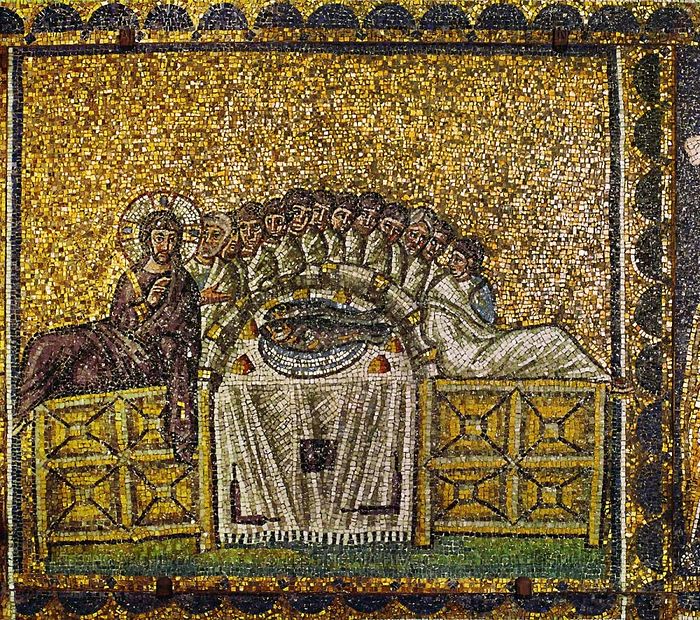 Mosaic at the Basilica of Sant' Apollinare Nuovo. Ravenna, 6th C.
Mosaic at the Basilica of Sant' Apollinare Nuovo. Ravenna, 6th C.
In patristic interpretations of the gospel, we find various answers to the question as to whether or not Judas received communion.
Judas did not receive communion:
Saint Hilary of Poitiers directly affirms that “Judas corpus Christi non sumpsit (did not receive the Body of Christ).11
Saint Ephraim the Syrian:
“In the same way, the Lord, by means of water, separated Judas from His disciples when He gave him bread soaked in water (sop),12 because he was not worthy of that bread, which together with wine, was distributed to the twelve apostles. For it is not right that the one who betrayed Him to death [Judas], should receive in the form of bread, Him [Jesus] who saves from death.”13
Judas received communion:
Saint John Chrysostom:
“Then, the Gospel says: as they were eating, Jesus took bread, and blessed it, and brake it, and gave it to the disciples, and said, Take, eat; this is my body. And he took the cup, and gave thanks, and gave it to them, saying, Drink ye all of it; For this is my blood of the new testament, which is shed for many for the remission of sins. (Matt. 26:26-28) Judas was there when the Lord spoke these words. This is the blood, O Judas, which you sold for thirty pieces of silver! This is blood, for which you shortly before shamelessly bargained with the ungrateful Pharisees. O, the great mercy of Christ! O, the ingratitude of Judas! The Master nourished, and the slave betrayed. That one sold, having taken thirty pieces of silver, and Christ gave his own blood as a ransom for us, and he would have given it to the seller, if, of course, he wanted it, because Judas was there before the betrayal, he took part in the holy meal, and tasted the Last Supper.”14
Saint Augustine of Hippo:
“It must be understood that our Lord had already distributed the sacrament of His body and blood to all His disciples, among whom was Judas also, as Luke narrates: And after that, we came to this, where, according to the relation of John, our Lord, by dipping and handing the morsel, does most openly declare His betrayer.”15
Blessed Theophylact of Ohrid expresses both points of view as having the right to exist:
“The evangelist added [him] to those who were eating, in order to show the inhumanity of Judas; if he was even a beast, then he should have at least softened up [his heart and evil intentions—Trans.], because he had already eaten one supper, from one holy table, and yet he, being convicted, had not been enlightened, and having even partaken of His Body, had not repented. However, some say that Christ communed His disciples with His Mysteries already by the time that Judas left. Therefore, we also must do likewise, that is to say, to excommunicate wicked people from the Divine Sacraments.”16
The Witness of the Evangelists
If we turn directly to the text of the Gospel, we will find the following. According to the Evangelists Matthew and Mark, the Savior points to His traitor before the institution of the Eucharist. According to the Gospel of Luke, this happens after the sacrament is performed. In the Gospel of John, the institution of the Sacrament of the Body and Blood of Christ finds itself beyond the focus of the narrative.
The famous exegete Bishop Cassian (Bezobrazov) offers the following reasoning on this subject:
“Was Judas permitted or not to receive the Eucharistic meal? This issue has been addressed in different ways. If based on the text of Matthew and Mark, it seems possible to defend the thesis that Jesus spoke His words about the traitor, who then left, after which, the institution of the Eucharist took place. This possibility is not excluded by John, since he does not speak of the institution of the Eucharist. The institution of the Eucharist in the Gospel of John could have taken place just prior to the Farewell Discourse, after the departure of Judas. (See John 13:30)
The situation is different with Luke, where the Lord speaks of the presence of the traitor after the establishment of the Eucharist (see: Luke 22:21). Jesus openly testifies that the hand of the one who betrayed Him is with Him at the table. From John, as well as from Matthew, (see Matt. 26: 21–25), it also follows that the traitor was named in his presence. Thus, the testimony of Luke suggests that the institution of the Eucharist took place before the departure of Judas, in other words, that he communed.
This conclusion may correspond to the actual state of affairs, if we hold on to the belief that the Evangelist Luke reproduced events in their chronological sequence, and remained faithful to his concern for chronological accuracy also during the narrative of the Last Supper. If the concordance of Luke at this point with Matthew and Mark on the one hand, and John, on the other hand, turns out to be not in agreement, then the witness of Luke may have a preemptive right to our attention.”17
That is to say, Bishop Cassian notes the obvious fact that out of the four evangelists, one of them—the Apostle Luke—testifies to the participation of Judas in the Eucharist, but none of the other three evangelists contradict this fact.
The Apostle John does not describe the sacrament. The Apostles Matthew and Mark only indicate that the Lord speaks of the betrayal of one of the disciples present prior to the Eucharist. But, firstly, these evangelists did not say that Judas left after the revelation, and secondly, who can say that the prediction of the betrayal could not have occurred twice during the Last Supper—before and after the Lord’s institution of the Eucharist?
We know that the Lord has prophesied more than once about the betrayal of one of His closest disciples. So, we emphasize once again: the only testimony in the Gospel concerning the communing of Judas is found in the Gospel of Luke, and this testimony is not refuted or contradicted by any other evangelist, to which Bishop Cassian draws our attention.
The Liturgical texts of Holy Week as a powerful argument
However, the above arguments would not have decisive and even essential significance, if we could not confirm them with more weighty arguments, and such arguments can be found in our Divine Services, namely the services of the Holy Week, and more specifically, that of Holy Thursday and Great and Holy Friday. Among the authors of the liturgical texts of these days are Saints Cosmas of Maiuma and Saint Andrew of Crete, who allow us not only to perceive these texts as patristic literature, but as the voice of the Church.
The Orthodox Divine Service is built around the Eucharist—the Sacrament of the Body and Blood of Christ. Hieromartyr Irenaeus of Lyons insisted on the inextricable connection of Christian doctrine and the Eucharist: “Our doctrine is in accordance with the Eucharist, and the Eucharist, in turn, confirms the doctrine.”18
For this reason, we can be sure that our liturgical texts, and even more so—the texts dedicated to the institution of the Sacrament of the Eucharist, no doubt express the views of the whole Church, including the communing of Judas.
The services of Holy Thursday and Great and Holy Friday repeatedly and unequivocally state that Judas was a communicant of the Body and Blood of Christ along with the other apostles.
However, in modern textbooks on liturgics, one can find the opinion that there is a contradiction in the worship of these days.
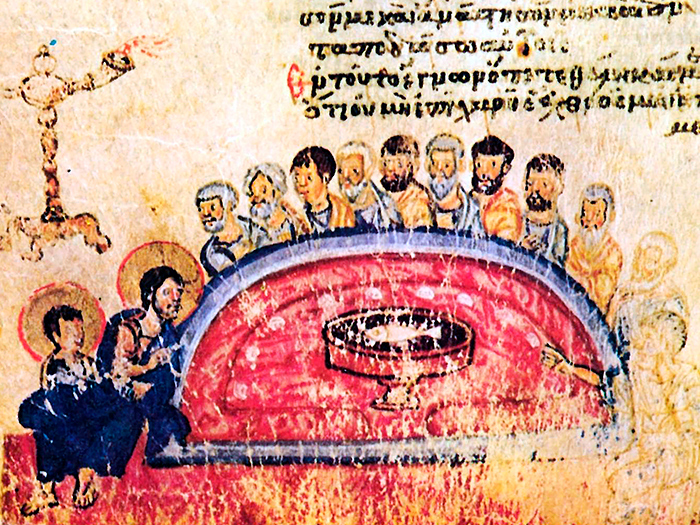 Chludov Psalter. Constantinople. Mid-9th C. State Historical Museum, Moscow
Chludov Psalter. Constantinople. Mid-9th C. State Historical Museum, Moscow
Concerning the stichera [and Aposticha] of the Matins of Great Thursday, the author of one of those manuals states the following: “These verses speak of how Judas participated in the Last Supper, but also says that Judas still did not partake of the Body and Blood of the Lord, but took only that morsel of bread that Christ dipped and offered him (sop)19 thereby indicating his betrayer.”
As the basis for such a conclusion, the following verse is proposed: “Let no one be ignorant of the Lord’s supper, O believers; Let no one approach the banquet with deceit like Judas, for he received a morsel, yet abandoned the Bread of Life. He looked like a disciple, but in fact he was a murderer.” (from the fourth verse of the Aposticha of the Bridegroom Matins of Holy Thursday)2021
[Translator’s Note: The verses in the Russian original are taken from Church Slavonic. Here, the original article goes on to describe the various ways the Slavonic may be translated and understood in Russian. These interpretations, however, lose their meaning in translation, and therefore they are omitted here. In essence, the author emphasizes from the text that the “Bread of Life” is Christ present in the Eucharist.]
In any case, it is impossible to conclude from the given verses that “Judas still did not partake of the Body and Blood of the Lord.”
An unsolved contradiction with that conclusion is found in the same textbook, concerning the author’s words about one of the stichera of the Great Vespers: “According to the text of this sticheron, Judas did take communion: it says here that he had “heavenly bread”22 in his mouth.23
Thus, according to the author of the manual on Liturgics, the liturgical texts of Holy Week about the communion of Judas allow us to think in two different ways. If you want, you can think that he partook of Communion, or rather, you can think he did not partake of communion. In part, we have already shown that this is not true, and we will try to show more.
In the Lenten Triodion, which contains the liturgical texts of the Holy Week, there are four chants which directly speak of Judas's tasting of the Body and Blood of Christ.
A Troparion of the ninth ode of the Triodion of Small Compline for Holy Thursday:
“Thou hath stretched forth thy hands, the same hands with which thou received the bread of incorruption, thou didst receive the pieces of silver, thy mouth and the lips thereof, with which thou gavest the kiss of betrayal, with that same mouth thou didst receive the Body and Blood of Christ; but woe unto thee, as Christ has said24.”25
Two troparia from the eight ode of the canon of Matins of Holy Thursday:
“Iscariot, that man of ill-omened name, forced from his mind the law of love, and moved to betrayal the feet which Thou hadst washed, O Christ. He then ate Thy Bread, even Thy Divine Body, lifted up his heel against Thee, and knew not how to cry: “Praise the Lord, all ye works of the Lord! Exalt Him throughout all ages!”
“Without conscience Judas accepted the Body that cleanses from sin and the Blood that was shed for the world. But he was not ashamed of drinking what he had sold for a price. He was not offended at evil, and knew not how to cry: “Praise the Lord, all ye works of the Lord! Exalt Him throughout all ages!”26
Vespers of Great and Holy Thursday.27 The Stichera at “Glory … now and ever”, and “Lord I have cried to Thee”:
Truly Judas is descended from those vipers, who ate manna in the wilderness, yet murmured against Him Who nourished them. For, while the food was still in their mouths, those ungrateful men reviled God. So, too, this godless man, while still bearing in his mouth the Heavenly Bread, contrived the betrayal of the Savior. What greedy purpose! What inhuman insolence! He sells the One Who nourished him. He delivers to death the Master Whom he loved. Truly this lawless man is their son. With them he will inherit perdition. Spare our souls of such inhumanity, O only Lord of boundless mercy!28
The cited texts, in this author’s opinion, are so eloquent in and of themselves that they require no comment. In illustrations of these texts of the Last Supper, Judas is among the apostles putting his hand into a bowl on the center of the Passover table, in which there is a fish—a symbol of Christ, that is to say, Communion.
The Lord’s immeasurable long-suffering
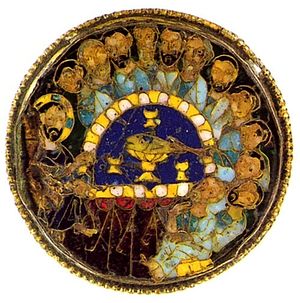 Enamel diskos medallion. Constantinople. 9th-10th C. There are other texts in the Triodion that can be understood as an indication that Judas communed, but they are not as unambiguous as those already quoted, and can be interpreted as an indication of the participation of Judas not in the Eucharist specifically, but in the Last Supper in a general sense. Nevertheless, there is no single text in the Triodion that speaks to the departure of Judas specifically before Communion was given.
Enamel diskos medallion. Constantinople. 9th-10th C. There are other texts in the Triodion that can be understood as an indication that Judas communed, but they are not as unambiguous as those already quoted, and can be interpreted as an indication of the participation of Judas not in the Eucharist specifically, but in the Last Supper in a general sense. Nevertheless, there is no single text in the Triodion that speaks to the departure of Judas specifically before Communion was given.
But in the Triodion, there are words revealing to us the reason for the Lord's extreme condescension to an unfaithful disciple:
“What caused thee, O Judas, to betray the Savior? Did he set thee aside from the Disciples? Did he deny thee the gift of healing? Did he take supper with the others and send thee away from the table? Did he wash the feet of the rest and pass thee by? Of how much goodness hast thou become forgetful? Yea, thine unpraiseworthy mind hath been exposed. But his incalculable longsuffering and his great mercies are proclaimed with praise.”29
According to the given text, the basis of such condensation that the Lord gave to His betrayer is “incalculable longsuffering” and “great mercy.” It is difficult for the faithful Christian consciousness to accept the idea that our Lord Jesus Christ, knowing about the upcoming betrayal, admitted the traitor to the Communion of His Body and Blood, to the extreme degree of union with Himself in the sacrament of love, in the New Testament “Holy of Holies”. But: My thoughts are not your thoughts, neither are your ways my ways, saith the Lord. For as the heavens are higher than the earth, so are my ways higher than your ways, and my thoughts than your thoughts (Isaiah 55:8-9).
If you think about it, the communing of Judas fits into the theme of the kenosis of Christ—that unthinkable “self-emptying” of the Son of God, which began in the Incarnation and ended in a shameful and painful death on the Cross. In the case of Judas, we see the same extreme condescension and humiliation of the Savior to the human person. Even knowing that He will be betrayed by Judas, the Lord does everything possible to appeal to the traitor, including allowing him, defiled by passions and unbelief, to accept the sacrament of His Pure Body and Blood, so that the apostate does not have even the least excuse, which the above Kathisma says.
Thus, the sacrament of Judas shows us that the Lord does not forsake any human, even at the extreme stage of moral decline; but while such a person is alive, He seeks his salvation and gives us all the possible and necessary means for our return to God. And the participation of Judas in the sacrament of Holy Communion gives us hope and even confidence that in our most extreme life situations, and even in a state of retreat from God, the Lord does not leave us.
But the same fact of the communion of the betrayer, at the same time, serves as a terrible warning to us. It turns out that without good conscious and sincere repentance, even the greatest Church sacrament not only does not benefit a person, but also makes him a vessel and instrument of satan, as St. John Chrysostom reminds us:
“At that time, Judas was unworthy of participating in the Last Supper, and going out he betrayed the Lord. (This happened so) that you would understand that those who are unworthy of participating in the sacraments, [but do so anyways], are especially attacked by the devil, and that they are subject to greater punishment. I say this, not to intimidate you, but to make you more attentive to yourself. Just as bodily food that enters a shrunken stomach aggravates stomach disease, so spiritual food, when taken improperly, attracts great condemnation. So, I implore you, let no one, who, having unclean thoughts in his soul, [receive communion], but let us cleanse our heart. We are the temples of God, if we are clean. Let’s make our soul pure.”30
If it seems to us that we are far from the danger of following Judas in the betrayal of Christ, then this only seems that way to us. And in order to really move away from this surprisingly capturing abyss, it is necessary that the memory of the betrayal of one of the closest disciples of Christ, after the reception of the Holy Mysteries, becomes for us a kind of vaccination or warning. One must be prepared to repeat the words of the Apostles in response to the words of Christ: “Verily I say unto you, that one of you shall betray me”, and with exceeding sorrow, say, “Lord, is it I?”

